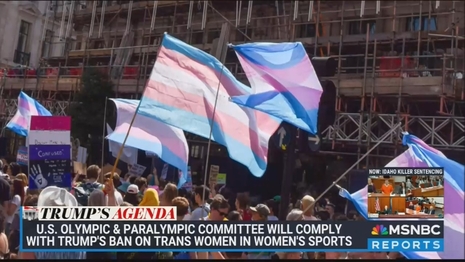On Tuesday, NBC News released an article about the U.S. Olympic and Paralympic Committees decisions to side with President Trump’s ban on biological men from competing against women. NBC attempted to bring forth narratives against the decision by using cherry picked examples and flawed research.
NBC started by making the claim that “no athlete has won an Olympic medal while competing as an openly transgender woman,” in an attempt to gain sympathy for the opposition. Just because it hadn’t happened yet, didn’t mean it will never happen, not to mention winning was literally the goal of competing to begin with, hence the reason for the Trump administration's decision.
The ban was also implemented by the Paralympics, where biological man Valentina Petrillo won two bronze medals in the 200M and 400M Paralympics against women with impaired vision.
NBC then brought up NCAA President Charlie Baker's statement to the Senate that he knew of fewer than 10 transgender collegiate athletes.
As long as it’s only 10 people gaining an unfair advantage against women it’s fine.
Lia Thomas, a biological man, won a national title and set multiple records against women. Juniper Eastwood competed as a man for two years in college, came back from injury as a woman, and won the mile at the Big Sky Conference indoor track championships.
 Overall, a study by the United Nations showed transgender athletes had taken over 600 medals from women across 29 different sports.
Overall, a study by the United Nations showed transgender athletes had taken over 600 medals from women across 29 different sports.
NBC then linked a study by the Canadian Centre for Ethics in Sport that found that transgender women who have “undergone testosterone suppression have no clear biological advantages over cis women in elite sport.”
They try to claim that 12 months of hormone suppression was ample time for no clear biological advantages, despite multiple studies suggesting that they did not fully eliminate differences in muscle mass, bone density, or other athletic performance factors.
In a failed attempt to back their claim, NBC cited biological man CeCe Telfer, who was deemed ineligible to participate in the Paris Games because of failure to meet hormone standards. Ironically, Telfer didn’t meet the hormone standards despite NBC trying to use her as a backing for their study of the effectiveness of hormone suppression.
Telfer competed on the men's track & field team in college before transitioning and winning the Division II National Championship in the 400-meter hurdles against women. Telfer then cited being over 6 feet tall as a disadvantage due to ‘wind resistance.’




